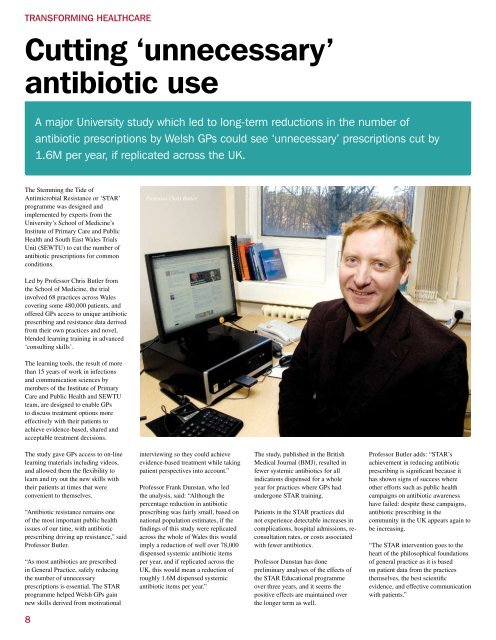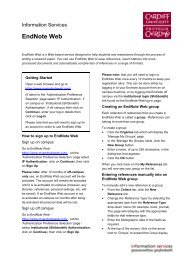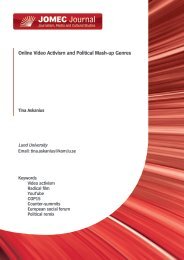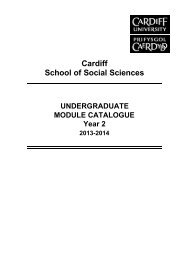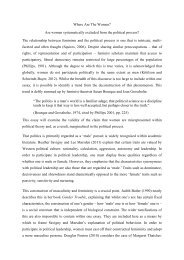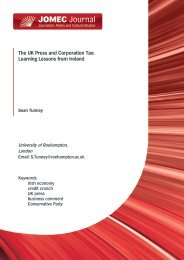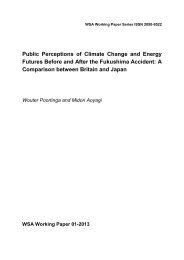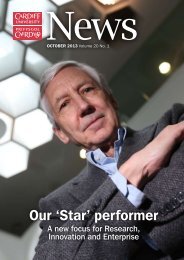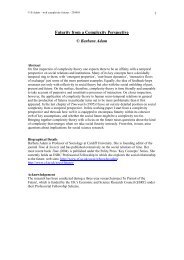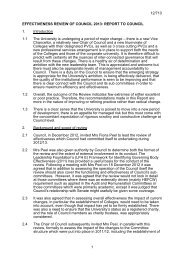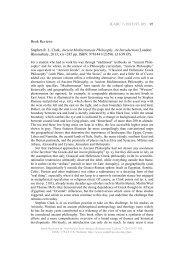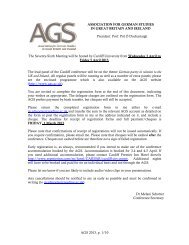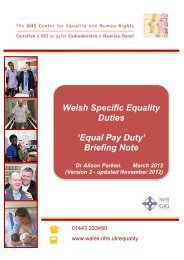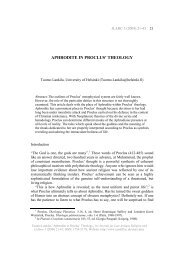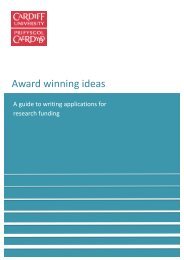January's issue of Cardiff University News
January's issue of Cardiff University News
January's issue of Cardiff University News
Create successful ePaper yourself
Turn your PDF publications into a flip-book with our unique Google optimized e-Paper software.
TRANSFORMING HEALTHCARE<br />
Cutting ‘unnecessary’<br />
antibiotic use<br />
A major <strong>University</strong> study which led to long-term reductions in the number <strong>of</strong><br />
antibiotic prescriptions by Welsh GPs could see ‘unnecessary’ prescriptions cut by<br />
1.6M per year, if replicated across the UK.<br />
The Stemming the Tide <strong>of</strong><br />
Antimicrobial Resistance or ‘STAR’<br />
programme was designed and<br />
implemented by experts from the<br />
<strong>University</strong>’s School <strong>of</strong> Medicine’s<br />
Institute <strong>of</strong> Primary Care and Public<br />
Health and South East Wales Trials<br />
Unit (SEWTU) to cut the number <strong>of</strong><br />
antibiotic prescriptions for common<br />
conditions.<br />
Pr<strong>of</strong>essor Chris Butler<br />
Led by Pr<strong>of</strong>essor Chris Butler from<br />
the School <strong>of</strong> Medicine, the trial<br />
involved 68 practices across Wales<br />
covering some 480,000 patients, and<br />
<strong>of</strong>fered GPs access to unique antibiotic<br />
prescribing and resistance data derived<br />
from their own practices and novel,<br />
blended learning training in advanced<br />
‘consulting skills’.<br />
The learning tools, the result <strong>of</strong> more<br />
than 15 years <strong>of</strong> work in infections<br />
and communication sciences by<br />
members <strong>of</strong> the Institute <strong>of</strong> Primary<br />
Care and Public Health and SEWTU<br />
team, are designed to enable GPs<br />
to discuss treatment options more<br />
effectively with their patients to<br />
achieve evidence-based, shared and<br />
acceptable treatment decisions.<br />
The study gave GPs access to on-line<br />
learning materials including videos,<br />
and allowed them the flexibility to<br />
learn and try out the new skills with<br />
their patients at times that were<br />
convenient to themselves.<br />
“Antibiotic resistance remains one<br />
<strong>of</strong> the most important public health<br />
<strong>issue</strong>s <strong>of</strong> our time, with antibiotic<br />
prescribing driving up resistance,” said<br />
Pr<strong>of</strong>essor Butler.<br />
“As most antibiotics are prescribed<br />
in General Practice, safely reducing<br />
the number <strong>of</strong> unnecessary<br />
prescriptions is essential. The STAR<br />
programme helped Welsh GPs gain<br />
new skills derived from motivational<br />
interviewing so they could achieve<br />
evidence-based treatment while taking<br />
patient perspectives into account.”<br />
Pr<strong>of</strong>essor Frank Dunstan, who led<br />
the analysis, said: “Although the<br />
percentage reduction in antibiotic<br />
prescribing was fairly small, based on<br />
national population estimates, if the<br />
findings <strong>of</strong> this study were replicated<br />
across the whole <strong>of</strong> Wales this would<br />
imply a reduction <strong>of</strong> well over 78,000<br />
dispensed systemic antibiotic items<br />
per year, and if replicated across the<br />
UK, this would mean a reduction <strong>of</strong><br />
roughly 1.6M dispensed systemic<br />
antibiotic items per year.”<br />
The study, published in the British<br />
Medical Journal (BMJ), resulted in<br />
fewer systemic antibiotics for all<br />
indications dispensed for a whole<br />
year for practices where GPs had<br />
undergone STAR training.<br />
Patients in the STAR practices did<br />
not experience detectable increases in<br />
complications, hospital admissions, reconsultation<br />
rates, or costs associated<br />
with fewer antibiotics.<br />
Pr<strong>of</strong>essor Dunstan has done<br />
preliminary analyses <strong>of</strong> the effects <strong>of</strong><br />
the STAR Educational programme<br />
over three years, and it seems the<br />
positive effects are maintained over<br />
the longer term as well.<br />
Pr<strong>of</strong>essor Butler adds: “STAR’s<br />
achievement in reducing antibiotic<br />
prescribing is significant because it<br />
has shown signs <strong>of</strong> success where<br />
other efforts such as public health<br />
campaigns on antibiotic awareness<br />
have failed: despite these campaigns,<br />
antibiotic prescribing in the<br />
community in the UK appears again to<br />
be increasing.<br />
“The STAR intervention goes to the<br />
heart <strong>of</strong> the philosophical foundations<br />
<strong>of</strong> general practice as it is based<br />
on patient data from the practices<br />
themselves, the best scientific<br />
evidence, and effective communication<br />
with patients.”<br />
8


